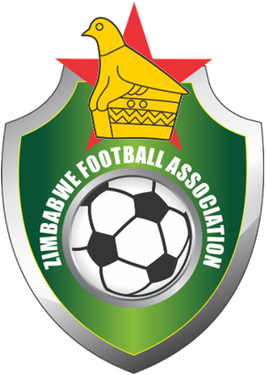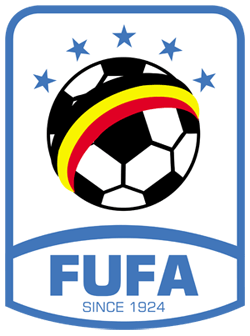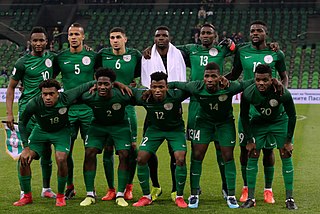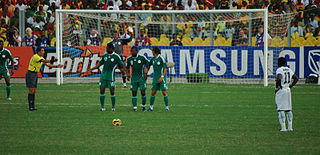
The Africa Cup of Nations commonly referred to as the TotalEnergies Africa Cup of Nations for sponsorship reasons, or simply AFCON or CAN, is the main international men's association football competition in Africa. It is sanctioned by the Confederation of African Football (CAF), and was first held in 1957. Since 1968, it has been held every two years, switching to odd-numbered years in 2013.

The Nigeria national football team represents Nigeria in men's international football. Governed by the Nigeria Football Federation (NFF), they are three-time Africa Cup of Nations winners, with their most recent title in 2013. In February 2024, the Nigerian national football team was ranked 28th in the FIFA rankings. The team has qualified for six of the last eight FIFA World Cups, missing only the 2006 and 2022 editions. They have reached the round of 16 on three occasions. Their first World Cup appearance was the 1994 edition. The team is a member of FIFA and Confederation of African Football (CAF).

The South Africa men's national soccer team represents South Africa in men's international soccer and it is run by the South African Football Association, the governing body for Soccer in South Africa. The team's nickname is Bafana Bafana, and South Africa's home ground is FNB Stadium, which is located in Johannesburg. The team's greatest result was winning the Africa Cup of Nations at home in 1996. The team is a member of both FIFA and Confederation of African Football (CAF).

The Egypt national football team, nicknamed "Pharaohs", represents Egypt in men's international football, and is governed by the Egyptian Football Association (EFA), the governing body of football in Egypt.

The Ivory Coast national football team represents Ivory Coast in men's international football. Nicknamed the Elephants, the team is managed by the Ivorian Football Federation (FIF). The team has won the Africa Cup of Nations three times, in 1992, 2015 and 2023, and has qualified for the FIFA World Cup three times, in 2006, 2010, and 2014.

The Liberia national football team, nicknamed the Lone Stars, represents Liberia in men's international football and is controlled by the Liberia Football Association. Although the nation produced the 1995 FIFA World Player of the Year, George Weah, its football team has never qualified for the FIFA World Cup and has qualified for the Africa Cup of Nations just twice—in 1996 and 2002. It is a member of both FIFA and the Confederation of African Football (CAF).

The Zimbabwe national football team represents Zimbabwe in men's international football and is controlled by the Zimbabwe Football Association (ZIFA), formerly known as the Football Association of Rhodesia. The team has never qualified for the FIFA World Cup finals, but has qualified for the Africa Cup of Nations five times. Zimbabwe has also won the COSAFA Cup a record six times. The team represents both FIFA and Confederation of African Football (CAF).

The Burkina Faso national football team represents Burkina Faso in men's international football and is controlled by the Burkinabé Football Federation. They were known as the Upper Volta national football team until 1984, when Upper Volta became Burkina Faso. They finished fourth in the 1998 Africa Cup of Nations, when they hosted the tournament. Their best ever finish in the tournament was the 2013 edition, reaching the final.

The Uganda national football team represents Uganda in association football and is controlled by the Federation of Uganda Football Associations.

The 1994 African Cup of Nations was the 19th edition of the Africa Cup of Nations, the association football championship of Africa (CAF). It was hosted by Tunisia, who replaced original hosts Zaire. Just as in 1992, the field of twelve teams was split into four groups of three. Nigeria won its second championship, beating Zambia 2–1 in the final.
Listed below are the dates and results for the 1994 FIFA World Cup qualification rounds for the African zone (CAF). For an overview of the qualification rounds, see the article 1994 FIFA World Cup qualification.

Emmanuel Amunike is a Nigerian professional football manager and former professional football player who played as a winger.

Rashidi Yekini was a Nigerian professional footballer who played as a forward. He is all-time top goalscorer for his nation.

Stephen Okechukwu Keshi was a Nigerian football player and manager.

Bridge Football Club is a Nigerian football club based in Lagos that was founded in the mid-1970s. As a result of an association with the Julius Berger construction company, the club was known as Julius Berger Football Club until 2010. The club has won national championships and competed internationally. Players such as Odion Ighalo, David Adekola, Yakubu, Taribo West, Sunday Oliseh, Samson Siasia, Emmanuel Amuneke, Rashidi Yekini, Garba Lawal, and Mutiu Adepoju have played for the club.

Football is the most popular sport in Nigeria. The Nigeria national football team competes regularly for international titles and many Nigerian footballers compete in Europe, particularly in England. Nigeria has one of the finest national teams in Africa and has produced many notable footballers including Mudashiru Lawal, Rashidi Yekini, Jay Jay Okocha, Nwankwo Kanu, Vincent Enyeama, Joseph Yobo, Mikel John Obi and Victor Osimhen.
Tom Saintfiet is a Belgian football coach and former player. He is the current head coach of the Philippines national team.
Association football is the most popular sport in nearly every African country, and thirteen members of the Confederation of African Football (CAF) have competed at the sport's biggest event – the FIFA World Cup.

The Zambia women's national association football team represents Zambia in association football, participating in qualifying tournaments for the FIFA Women's World Cup and other African-based competitions. It made its debut in the 2023 FIFA Women's World Cup, becoming the first landlocked nation in Africa to qualify for a senior World Cup in either men's or women's soccer.

Jollof derby is the moniker given to any encounter between the national football teams of Nigeria and Ghana. The derby takes its name from the nations' long-standing rivalry over who makes the best Jollof rice. The rivalry between Ghana and Nigeria extends beyond the realm of sports and has a deep-rooted history. The divide extends beyond just football and encompasses aspects of culture, economy, and social status in West Africa. Debates have arisen regarding the origins and influences of music, the supreme culinary delight, and occasionally, the most robust economic system. Due to their shared colonial histories, there are natural areas of cultural overlap between these two nations. This overlap can be observed in their cuisine, traditions, cinema, music, and the use of Pidgin English. Consequently, collaborations between individuals from these two countries have been common.

















